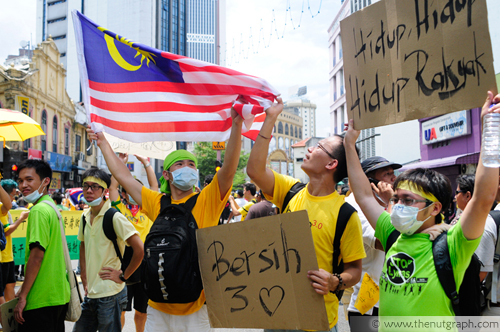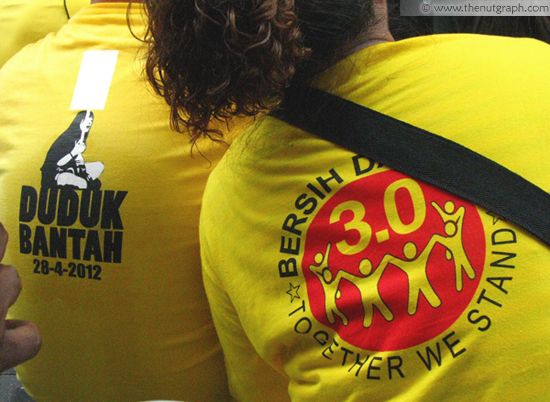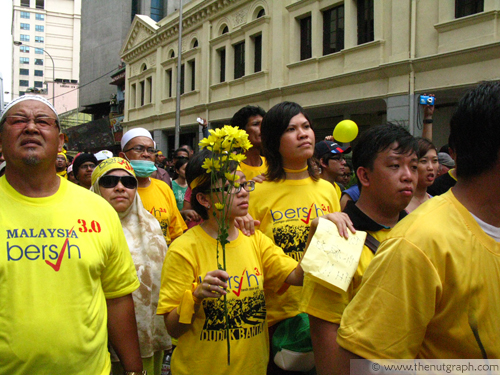IF you’re a Malaysian reading this, you will have seen what happened at Bersih 3.0. Whether or not you were in Kuala Lumpur on 28 April, or glued to Facebook or Twitter, you must have encountered images, videos, or reports of the colossal rally that started as a festive sit-in and ended in tear gas.
The fumes have cleared, but the air is still thick with claims and counterclaims. Many have accused the police of excessive force. The police have identified more than 100 suspected lawbreakers at the rally. To say nothing of the barrier breaching, censorship, political hijacking, supposedly UN-approved teargas, and unidentifiable policemen.
And then there are the stories. Stories from extraordinary Malaysians who participated in Bersih 3.0 for different reasons, and who encountered different amounts of tear gas. But who all felt a common impulse to share their observations with the wider community.

So what was the impact of Bersih 3.0? High-profile statements and official spin aside, I believe it’s this collective storytelling that will impact democracy in Malaysia.
Democracy and stories
Political scientists have yet to agree on a definition of democracy. One thing is clear: it’s not just elections. It isn’t even just transparent and fair elections.
In fact, elections are a bit of a political oddity. Political scientist Benedict Anderson notes in The Spectre of Comparisons (1998) that voting “is almost the only political act imaginable in perfect solitude”. While most forms of political participation involve visible and organic collective action, voting is rigid and private. At the polls, political communities are fragmented into individual actors, for the sake of equal representation of every individual.
But this representation has little meaning unless the choices driving it are built on good information, and unless the representatives are held accountable to their mandates.
At one extreme, we have elections – a curiously constrained but universal part of democracy. At the other, there are rallies like Bersih 3.0 – climactic but often polarising moments of political participation. And in between are the ongoing and sometimes unexciting but nevertheless vital discourses that define the political sphere.
This is where the Bersih stories come in. We are witnessing a surge in the number of Malaysians expressing personal opinions in public spaces, because they rightly want to record and share the fact that they were there on 428.
Crucially, these stories don’t stand alone. Many writers say they were inspired to share after reading someone else’s story. The reader comments on many accounts of Bersih 3.0 show genuine, if occasionally confrontational, engagement with each other’s experiences of being Malaysian.

Building bridges
The Bersih stories are bridges. They connect the systematic symbolism of elections and the raw symbolism of mass assemblies with the practical realities of people who are back to their everyday lives. Only with more yellow clothing and less tolerance for some of the nondemocratic norms in our country.
They also connect individual Malaysians. The Bersih 3.0 narratives have come from a humbling variety of people. Seasoned bloggers. First-time protesters. Mothers. The daughter of an FRU officer. And – I accept charges of nepotism for this one – my cousin, a SEA Games medalist who attended the rally as a medic but was beaten by the police.
This virtual post-Bersih show-and-tell is democratic to its core. By sharing our stories, we affirm that individual experience matters to the larger group. That every voice has equal value.
For reasons that political scientists also have yet to agree on, Malaysia has seen a lot of bridge-building over the last few years. The March 2008 elections were pivotal. The results were a shock because no one, not even those who had voted for the opposition, had imagined there were so many others like them. After March 2008, it got a bit easier to dream together.
Then last July we had Bersih 2.0, where a fabulous hodgepodge of Malaysians flooded Twitter with Bersih stories. After the event, images of a woman holding a flower and drenched in chemically laced water made Anne Ooi a rallying point for countless netizens who claimed her as their Aunty Bersih.
Global bridges
Here’s another key way in which the Bersih stories are bridges: they connect Malaysians across the globe. After Bersih 2.0, the steering committee released a report titled “The awakening of the Malaysian diaspora”, celebrating the 4,000 overseas Malaysians who came together in 38 cities on 9 July.

Bersih 3.0 had an even larger international presence, reportedly spanning 85 locations in 35 countries. Watching photo montages of the Global Bersih 3.0 demonstrations is enough to trigger warm fuzzy patriotism, as well as incredulous laughter at the glorious improbability of it all.
This kind of bridge is essential when you’re living abroad. First, these shared social platforms facilitate the logistics for diasporic Malaysian gatherings in the first place. Second, they allow overseas Malaysians to express their continued stake in the country, and to share that articulation with those at home.
Internet bridges
Internet-based media has been key to my own bridge-building experience. Over the last six months, I have seen my electoral roll record on the Election Commission website change from a regular voting status, to a regular voting status with a postal voter application in process, and then back to a regular voting status with no acknowledgement of my absent voter application. My IC number then vanished completely from the electoral roll for a few weeks.
My original voter registration has yet to reappear in the electoral roll, but at least now the website says that my absent voter registration is being gazetted. Throughout this process, support from Facebook friends – Malaysian and otherwise – has kept me from thinking that I am a crazy brat for demanding my right to vote.
In some ways, there is nothing new about communications technology creating a shared space for the development of egalitarian national consciousness. In Imagined Communities (1983), Benedict Anderson argues that the sharing of ideas through the printing press is essential to the development of the “nationally-imagined community”.
In Malaysia, the government has always kept a fairly firm grip on the print media, stunting the development of a democratic imagined community.
Enter the internet. As Digital News Asia editor A Asohan observes, its messy decentralisation creates a virtual space for connections, stories and truth. Regardless of how much tear gas and censorship the government inserts into the physical public space.
We have a long way to go. We need to sustain the sharing of stories and reflections beyond the aftermath of a catalytic event through the drawn-out slog for political liberties. We need to discuss ways to translate the tentatively shared dreams into gritty policy solutions. We need to occupy these bridges – both defending them and filling them with traffic, in the name of a democratic Malaysia. ![]()

Hwa Yue-Yi is a proud Malaysian and a reluctant but hopeful product of the internet age.


siew eng says
Beautifully concluded. Wanna cry already.
Ghab says
In the views of many, the inclusion of the Bar Council in Bersih’s street walk for cleaner and fairer election is its justification and constitutional right to freedom of speech and expression, to assemble peaceably and without arms. We agreed, accepted and granted!
As someone remarks, “Bar Council’s democratic pretensions” in which I think as pretension as such. More to that, the Bar Council must be waken to acknowledge the provision for the security of the federation, public order or morality are constitutional rights, too.
I am in harmony with the Bar Council that it is the integral part of the judiciary, which is striving to be a constitutional institution for the cause by the given laws for peace and harmony. I have come to believe indefinitely it is not going to be so. The Bar Council has turned out to be a “movement” which has gone beyond the perimeter of its fundamental function for justice.
What they think right is just their construction of “code of injunction” and also their misrepresentation to defend the fundamental rights and freedom from those they think have abused the rule of law. At the same time, the other prevailing stipulated rights are totally ignored.
It seems exclusive; the movement has been told that it requires more than just being lawyers. They are required to march on the streets in order to uphold their brand of constructed justice. They are summoned to actively play broader roles for social conscience and more sense of responsibility because it is their democratic right to do so. This is an affirmed affidavit underlining the broadening of their new “code of injunction” for the movement. It smells mental anarchy to me.
They forget that they are also physiologically bound by their unconsciousness prejudice, bias and naivete in the meaning of upholding “justice”. The social and political conscience of justice falls into a thin line of dissent and bone of contention among them. As a result, the things that they rightly believe are not what they rightly behave and yet they are not even aware of their rightly values and beliefs.
The rightly shepherd who is trapped in and under the unconsciousness phenomenon is Dato’ Ambiga Sreenevasan , an ex-president of the Bar. Her unconsciousness bias could deliberately manipulate her sheep to walk against their own interest.
Of no doubt that she, the woman, was seen to have had led the movement but the peaceful march had gone berserk and beyond the pale. It seems to me she has not able to break her created three glasses but has tainted her glasses into darker black.
Further, the deficiency and adversity of the “movement” is when it becomes a partisan body in its advocacy by leadership. She has tarnished the integrity of our democracy and rule of law by not being impartial. In conjunction and as mentioned, the rights of the majority peace-loving Malaysians are ignored.
Advocating the march under Bersih [2.0] is an act beyond the function of its jurisdiction. It jeopardises its position and function as an advocator for justice and not being prejudice in our democratic system. We can smell again that the political motive of street demonstration is at large , to con the masses to overthrow undemocratically the present administration .
It is unfortunate Ambiga and the Bar Council have sucked themselves into being a political mercenary for social and civil liberty with their new “code of injunction” as the guiding principal for “their constructed justice by misrepresentation”. She calls for a place that Bersih [2.0] be part of the political evolution for a “radical” change in the Malaysian democracy.
Bersih [2.0] is her constructed cage for the sake of love, for her birds.
God loved the birds and invented trees. Man loved the birds and invented cages. ~ Jacques Deval, Afin de vivre bel et bien
Kong Kek Kuat says
@ Ghab
Wow, such an impressive comment, but yet you have not even a word of damnation for the other people who, under the guise of “security of the federation, public order or morality” as a “code of injunction” (which is constructed, too, if I may add), abuse the power WE entrusted them with. […]
I suppose you are also naive to the extent of your own “unconsciousness prejudice”. But of course, that old cliché, “power corrupts”, means that you will never see through your unconsciousness arrogance.
kasim baba says
Minta maaf saya tulis dalam Bahasa Malaysia (bahasa rasmi kita). Kalau ada apa masaalah boleh rujuk pada kamus. Dan juga kalau rasa saya punya komen tak bagus, pihak awak tak siar pun tak apa. Mengenai Bersih 3 yang dianjurkan oleh pihak Ambiga dan sekutu-kutunya, saya rasa perhimpunan itu sudah menjadi kotor dan jijik sebab apa, sebagai salah orang pemerhati dalam perhimpunan itu dimana saya berada di kumpulan Bersih dikawasan Sogo bersama kumpulan PAS, PKR. Kebanyakan geng-geng dari Gombak, Selayang dan Tanjung Malim — mereka sudah mula tidak bermoral semenjak pagi lagi dimana terdapat 4-5 orang penyokong Bersih yang saya kenali membeli rokok dan air tapi tak bayar semasa keadaan sesak di kedai mamak dekat panggung Odeon. Mamak tu memarahi mereka tapi mereka melarikan diri. Malunya.
Kedua, kumpulan dekat 8 orang kawan-kawan dari Selayang yang memang “orang lama” PKR bertindak membaling botol air mineral ke arah Land Rover polis yang melalui Jalan TAR dan tidak ada provokasi. Mereka memang sudah macam naik gila dan seronok melakukanya. Saya menasihati mereka jangan buat perkara yang tak elok tapi tak diendahkanya. Apa benda ini? Polis itu tak bersalah pun.
Ketiga. Kumpulan-kumpulan ini semasa kami berarak ke Dataran Merdeka menebalikan tong sampah di tepi jalan, menendang gerai-gerai (tutup) dengan kuat. Tak tahu apa motif mereka buat macam ini?
Semua adegan ini saya tak ambil gambar nanti malu Bersih 3. Saya pun penyokong PKR cabang Sri Gombak, tapi rasa hampa dengan penyokong-penyokong yang bersifat kebaratan ini. Kesimpulannya mungkin kumpulan-kumpulan lain yang bersifat macam mereka inilah yang mencetuskan pergaduhan dengan pihak polis, mereka inilah parasit yang sebenar, saya kenal sangat dengan mereka dan mereka BUKAN POLIS yang banyak bloggers yang menuduh pihak polis yang buat provokasi. Ambiga dan kumpulannya kena siasat betul-betul perkara ini, ramai dipihak kami tahu cerita sebenar. Tak adil menuduh polis sembarangan. Ada juga di pihak kita berperangai lebih hodoh dan bodoh memalukan dan mendatangkan kebencian je.
Li Peng Chong says
Dear Yue-Yi, I understand from your article you have applied to the EC to be an absent voter. I am currently a resident in Kazakhstan and would like to cast my vote without traveling to KL. Did you receive any response from the EC? I would like to know whether your request has been granted.
What is your thought on sending a letter as a collective mass of overseas voters to the EC?
Best Regards,
Li Peng
Yue-Yi says
Dear Li Peng, apologies for taking a such a long time to reply. Yes, I have just been entered into the electoral roll as an absent voter. Even though I am a full-time student, it took a fair amount of insistence at the London High Comm when I went there to register last October.
As far as I know, the EC still only allows full-time students and service[people] to register as absent voters, but all Malaysian foreign missions should be able to register first-time voters (who are subsequently expected to vote at home). But it’s definitely worthwhile to phone or drop by the embassy in Kazakhstan, if nothing else to let them know that overseas Malaysians are invested in our elections.
And I’m fully in support of collective action holding the government accountable. An NGO called MyOverseasVote has been coordinating some activism, and I’m sure they’d love to hear from you. http://myoverseasvote.org/how-can-i-help/ All the best with your efforts in Kazakhstan!
Sincerely,
Yue-Yi
Jeyapalan.T.S.Mahesan says
[…] Somewhere during the hurly burly of B3.0, there was a clip of the police, opening the barriers, and people surging in as if all was allright, straight into the FRU Box In! Do you have this clip? As this will immediately put paid to the “cause of the violence”.
The powers that be did not want the assembly to end peacefully. Hence, Ambiga’s statement – go disperse, was a “no can do”. But the real cops at the barricades, heard this and were instructed to open the barricades, not realising that the instructions were actually a trap. And then, the no-tags stepped in, even injuring the real cops! Please check!
Thank You,
Godspeed!
Jeya